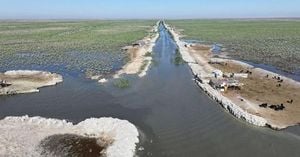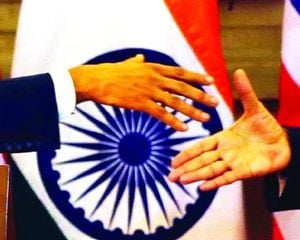From the tense fields of Ukraine to the marble halls of Washington, the fallout from the Russia-Ukraine war continues to reshape global alliances and provoke rapid responses from Western powers. This conflict, now entering its second year, has become emblematic of not just regional disputes but of global power dynamics, requiring nations to reassess their roles on the international stage.
Initially sparked by Russia's annexation of Crimea and subsequent military intervention, the war escalated with fierce battles around key cities like Kharkiv and Mariupol. The invasion has demanded immediate action from Western nations, leading to sanctions and military aid directed at Ukraine. The United States and its allies found themselves balancing support for Ukraine with concerns over direct confrontation with Russia.
The sheer scale of this humanitarian and military crisis cannot be understated. According to the United Nations, millions of Ukrainians have been displaced, and countless lives have been lost, creating not just refugees but also deep scars within European and global societal structures. The international community has been called upon to respond, and urgent humanitarian efforts have begun as close neighbors rush to provide shelter and resources.
Western military support to Ukraine transformed shortly after the conflict began. The provision of arms and ammunition quickly escalated to include advanced weapon systems. Reports indicated extensive shipments of artillery, drones, and missile systems from nations such as the U.S, the UK, and various European countries. This commitment reflects not only material support but also provides Ukraine with strategic assistance from intelligence-sharing to training troops.
Nonetheless, such actions have not come without controversy. Critics argue whether funneling weapons might provoke Russia and escalate the conflict even more. Some analysts fear it could lead to unpredictable consequences, possibly dragging NATO members closer to direct engagement with Russian forces. The escalation of rhetoric on both sides has exacerbated these fears, with aggressive posturing becoming the new norm.
Russia, on the other hand, has not remained passive. The Kremlin has repeatedly claimed its military goals are to protect Russian-speaking populations and to counter what it perceives as NATO’s westward expansion. Retaliatory measures have included cyberattacks against Western nations and threats of deploying nuclear weapons. Officials within Russia have continuously criticized Western countries for their involvement, presenting this as interference in what they term their sphere of influence.
At the core of the Western response is the undeterred commitment to Ukrainian sovereignty and territorial integrity. High-profile meetings among NATO allies increasingly focus on both military strategy and discussions around ensuring collective security. A new paradigm is forming within the alliance, signaling readiness for extended confrontation.
This war has also led to significant shifts in economic policies across participant nations. Countries dependent on Russian energy have been forced to recalibrate their energy sources, leading to historic investments in alternative energies. Sanctions imposed by Western nations have aimed to cripple the economic apparatus of the Kremlin, affecting everything from oil exports to technology imports. The international community, particularly Europe, has recognized the precarious balancing act of maintaining energy needs against the economic pressure on Russia.
Environmental discussions entwined with these energy policies have emerged, as countries seek to transition from fossil fuels to renewable resources. The war has accelerated timelines to achieve energy independence, highlighting the paradox of immediate energy transitions caused by long-term geopolitical conflicts.
The role of technology has also come to the forefront. The cyber front lines have blurred, with both sides using advanced cyber capabilities to influence public opinion and disrupt military logistics. Russia's cyber operations showcase malicious activities targeting both Ukrainians and the systems used to support their governance, aiming to sow distrust and undermine stability. Meanwhile, Ukrainian efforts have highlighted innovation, utilizing social media platforms not only for information dissemination but also for fundraising and garnering support globally.
Public sentiment has transformed within various countries as they witness the consequences of war through media coverage. Civil society has mobilized, with demonstrations advocating for peace and support for Ukraine appearing across major cities around the globe. Populist movements have noticed the changing dynamics, with some leaders advocating for stronger military support, reflecting regional historical ties and cultural affiliations with Ukraine.
Western governments are currently grappling with pressures from their citizenry to respond decisively to the conflict. The necessity for clear communication about objectives and expected outcomes is ever more present. Recent polls indicate increasing levels of public awareness and concern, emphasizing the need for democratic leaders to thoughtfully navigate between national interests and moral imperatives.
Meanwhile, China’s response has also drawn attention. The nation has maintained strategic ambiguity, advocating for dialogue and restraint on both sides. This careful positioning serves China's interests and reflects its aim to remain influential within global governance debates, even as it faces criticism over its own human rights practices.
The impact of the Russia-Ukraine conflict extends beyond immediate geopolitical games; it affects trade routes, security policy shifts, and alliances within new frameworks. History is being written not just through military conflict but through dialogues, sanctions, economic forays, and technological engagements. Where this will lead remains uncertain; nations are watching closely, considering both the resolutions to immediate concerns and their long-term consequences.
Leaders around the world are now faced with the formidable challenge of addressing immediate humanitarian needs alongside complex geopolitical strategizing. Each decision, each alliance, becomes part of this multifaceted puzzle where potential repercussions echo far beyond Ukraine's borders. The outcome remains unpredictable, but the push for resolution and the survival of national identities remain at the forefront of discussions.



